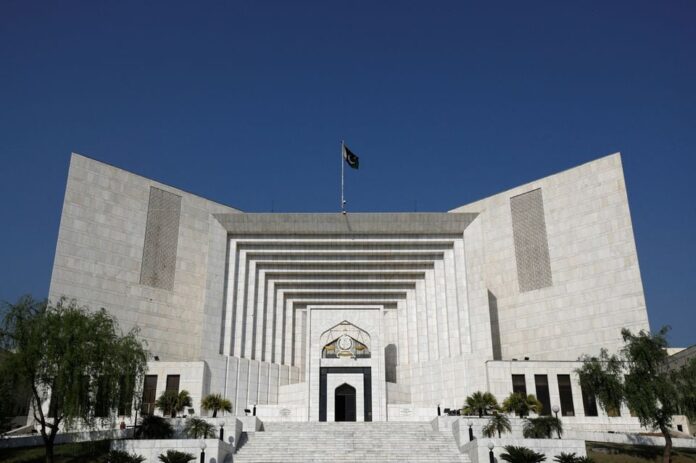Staff Report
ISLAMABAD: The Supreme Court (SC) on Wednesday adjourned the hearing of the Punjab election review case and the Supreme Court Review of Judgments and Orders Act 2023 — which mandates the establishment of a larger bench for reviewing a suo motu judgment — till June 13.
A three-member bench headed by Chief Justice of Pakistan Umar Ata Bandial had clubbed the Punjab election review case and the Review Order Act case earlier in the day.
The bench headed by the top judge also includes Justice Ijaz ul Ahsan and Justice Munib Akhtar.
During the hearing, CJP Bandial remarked that the court will try to make a decision on the Election Commission of Pakistan’s (ECP) plea for reviewing the verdict on the Punjab elections at the earliest.
“We have received some petitions. The matter of the Review Order Act has to be seen at this stage,” CJP Bandial said. He said that the court would issue notice to the AGP, after which the bench will hear the ECP’s review plea under the Review Order Act.
The CJP then asked PTI lawyer Barrister Ali Zafar to give his views on the Review Order Act. At this, Barrister Zafar maintained that the SC Review Order Act was against the Constitution.
“The same matter was raised in the SC Practice and Procedure Act, on which the Supreme Court has given a stay,” the lawyer contended, claiming that the same stay applied to the Review Order Act as well. He contended that the SC had the authority to hear the ECP’s review plea as the Review Order Act did not yet apply to the court due to the stay.
The court can hold back the decision on the Punjab election review case till the decision on Review Order Act, the bar-rister said while urging the court to decide on the election case soon.
At this, Justice Akhtar remarked that the ECP’s lawyer would have to give arguments before a larger bench if the Re-view Order Act is enforced. “How could the court hear the Punjab election case if the SC Review Order Act has been enforced,” he asked.
He also asked the lawyer to tell him how did the Review Order Act not apply to the SC. Meanwhile, CJP Bandial re-marked that everyone wanted a decision on the Punjab election review case.
“There are certain limits for [filing] an appeal,” the top judge remarked, adding that the ECP’s lawyer had contended that they had extensive authorities. “The matter of elections is a national issue. Implementation on the May 14 orders is not possible but this has become a historical verdict,” he added.
Meanwhile, petitioners Zaman Khan Wardag and Ghulam Mohiuddin adopted the arguments of Barrister Zafar. The court remarked that the petitioners maintained in the pleas that the act was illegal and a constitutional amendment was required to extend the jurisdiction of reviews.
A stay had already been issued on the implementation of the SC Practice and Procedure Act by the larger bench, the court stated while ordering to fix both cases for hearing together on June 13. CJP Bandial remarked that the SC would conduct hearing on the cases daily after the said date.
The court, while issuing notices to AGP, President Arif Alvi, the federal government, Ministry of Parliamentary Affairs, ordered fixing the hearing of both cases together on June 13. The petitioner Advocate Riaz Hanif Rahi in his plea against the Review of Judgments and Orders Act 2023 requested the court to “set aside [the Act] as unconstitutional being Ultra Vires, void ab-initio and issued without jurisdiction [and] of no legal effect.”
The petition filed by Rahi made the government a respondent through the Ministry of Law and Justice Secretary and Senate Secretariat Secretary Muhammad Qasim Samad Khan.
Citing Articles 188 and 191 of the Constitution, it contended that the law is “unconstitutional” and has been passed by the government for “its personal advantage to avoid the regime of present CJP without taking into consideration the public interest”.
Rahi further submitted that the respondents had no jurisdiction to go beyond their constitutional limits under “extra-neous considerations and ulterior motives”. The law came into effect on May 5, 2023.
Referring to the Act, Law Minister Azam Nazeer Tarar alluded to Article 188 of the Constitution and said it [the law] empowers the SC subject to the provision of any Act of Majlis-e-Shoora and any rules made by the top court, to re-view any judgment pronounced or any order made by it. He said the latest legislation is procedural in nature.
The law minister said the bill was formulated under the spirit of Article 188 of the Constitution. In the previous hearing of the ECP’s petition challenging the SC’s right to announce a date for holding elections in the province of Punjab, CJP Bandial had indefinitely adjourned the hearing after Attorney General for Pakistan (AGP) Mansoor Usman Awan cited the review of judgment order.
The brief hearing came to an end after the AGP had informed the bench that the review order had come into effect. The electoral watchdog in its petition had earlier submitted that, under the Constitution, the power of the announce-ment of the date for the general elections is vested in bodies other than any judicial institution; therefore, the im-pugned order under review had “breached the salient principle of the trichotomy of powers and thus is not sustaina-ble”.
Moreover, the ECP had submitted that in the presence of an elected government in Punjab, the general elections to the National Assembly cannot be conducted fairly.




